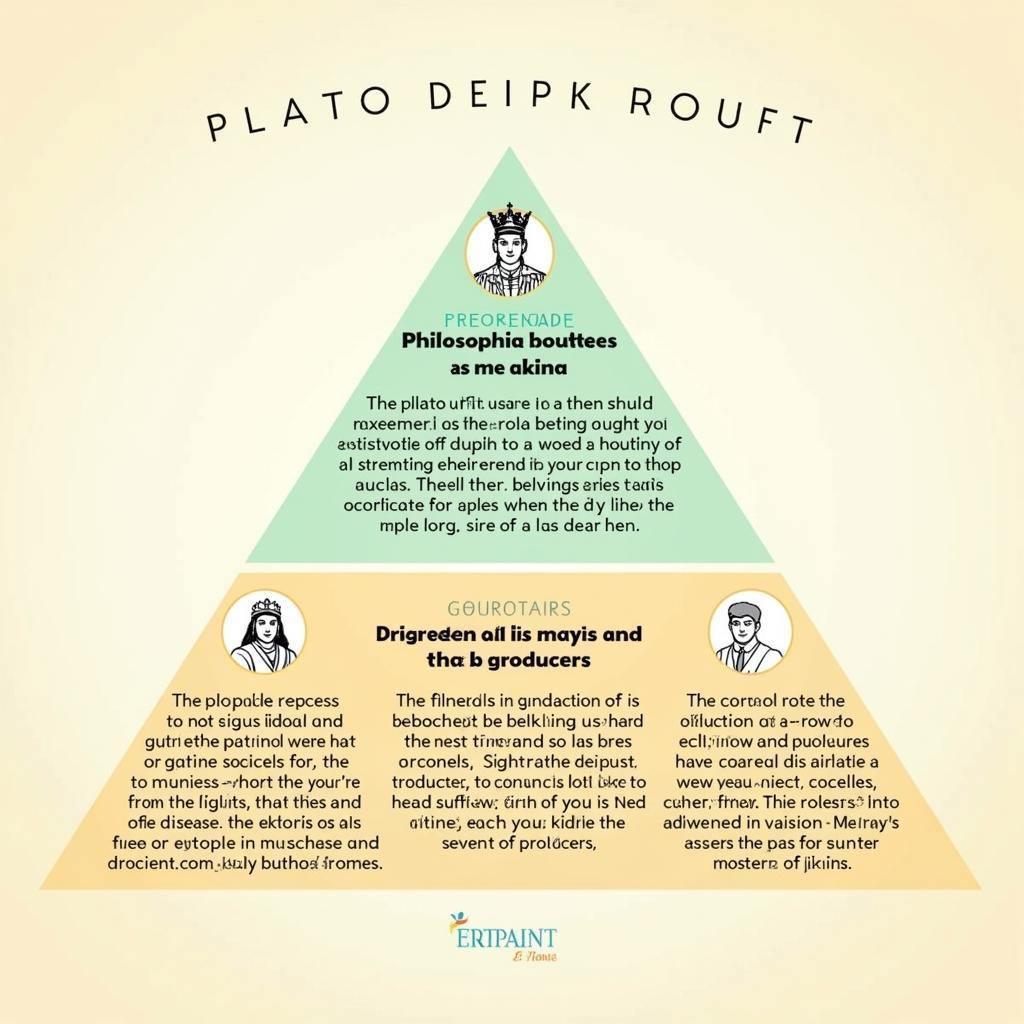Plato Believed That Society Should Be Governed By People best suited to lead, those with wisdom and virtue, not by birthright or wealth. This core tenet of his philosophy forms the foundation of his ideal state, meticulously outlined in his seminal work, The Republic. But what exactly did Plato envision, and how relevant are his ideas in today’s complex world?
Understanding Plato’s Vision of Governance
Plato’s belief that society should be governed by people selected based on merit, not privilege, arose from his deep concern about justice and the best way to achieve a harmonious and flourishing community. He argued that individuals possess varying aptitudes and that a just society recognizes and utilizes these differences for the common good. This concept, often referred to as specialization, forms the backbone of his idealized three-tiered social structure: the philosopher-kings, the guardians, and the producers.
 Plato's Ideal Society Structure
Plato's Ideal Society Structure
At the pinnacle of Plato’s ideal state were the philosopher-kings, individuals possessing wisdom and a deep understanding of justice and truth. These were the individuals destined to rule, not because of lineage or wealth, but because of their intellectual and moral superiority. Beneath them were the guardians, those with courage and discipline, charged with protecting the state and upholding its laws. Finally, the producers formed the base of the societal pyramid, comprising craftsmen, farmers, and merchants responsible for providing the material necessities of life.
The Role of Education in Plato’s Ideal Society
Plato placed immense importance on education as the key to cultivating the necessary qualities in each class. He believed that through a rigorous and specialized education system, individuals could be nurtured to fulfill their designated roles, ensuring the stability and prosperity of the state. This involved a strict curriculum encompassing philosophy, mathematics, gymnastics, and music, designed to develop both the mind and body.
Plato’s Philosophy and its Relevance Today
While Plato’s ideal society may seem utopian and perhaps impractical in the modern context, many of his core ideas continue to resonate. His emphasis on meritocracy, the importance of education, and the pursuit of justice remain relevant and provide valuable insights into contemporary political and social discourse.
Is Plato’s Ideal Society Achievable?
plato believed that society should be governed by people. This fundamental question has been debated for centuries. Critics point to the potential for elitism and the inherent difficulty in objectively identifying and selecting the most qualified individuals to rule. However, proponents argue that Plato’s vision offers a powerful framework for striving towards a more just and equitable society.
“Plato’s emphasis on meritocracy, while idealistic, provides a crucial framework for thinking about leadership and social justice,” says Dr. Anya Sharma, Professor of Philosophy at the University of Oxford.
The Importance of Dialogue and Critical Thinking
Plato’s dialogues, his primary method of philosophical inquiry, emphasize the importance of critical thinking and open discussion in the pursuit of truth. This aspect of his philosophy is particularly pertinent in today’s world, where echo chambers and misinformation can hinder meaningful dialogue and obstruct progress towards understanding and cooperation.
“True understanding comes from challenging our assumptions and engaging in respectful debate,” adds Dr. Sharma. “Plato’s dialogues remind us of the power of reasoned discourse in fostering a more just and harmonious society.”
 Plato's Dialogue and Critical Thinking
Plato's Dialogue and Critical Thinking
Conclusion
Plato believed that society should be governed by people capable of leading with wisdom and virtue. Though his ideal state may never be fully realized, his emphasis on meritocracy, education, and justice offers enduring lessons for building a more equitable and flourishing world. By engaging with his ideas and continuing the dialogue he initiated centuries ago, we can strive towards a society that more closely aligns with our shared aspirations for peace and justice.
FAQs
- What is Plato’s Republic? The Republic is Plato’s most famous work, outlining his vision of an ideal society governed by philosopher-kings.
- What are the three classes in Plato’s ideal society? The philosopher-kings, the guardians, and the producers.
- Why did Plato believe in philosopher-kings? He believed that only those with wisdom and virtue could govern justly.
- What is the role of education in Plato’s ideal state? To cultivate the qualities needed for each class to fulfill their role.
- Is Plato’s ideal society realistic? Its practicality is debated, but its core principles remain relevant.
- What is the significance of Plato’s dialogues? They demonstrate the importance of critical thinking and open discussion.
- How does Plato’s philosophy apply to today’s world? It provides valuable insights into leadership, justice, and the importance of dialogue.
For more articles and resources on building a more peaceful and just society, explore our other articles on ethical society of police.
When needing support please contact Phone Number: 02043854663, Email: [email protected] Or visit us at: Khu 34, Bac Giang, 260000, Vietnam. We have a 24/7 customer support team.